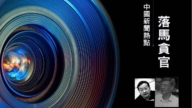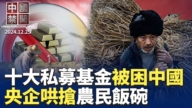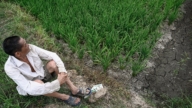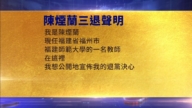【新唐人2014年09月17日讯】苏格兰独立公投进入倒计时。18号,苏格兰境内16岁以上的居民将选择“是”或“否”,来决定苏格兰是否要脱离英国,成为一个独立的国家。目前,统独两派的民调支持率非常接近,最后结果如何,恐怕要等公投揭晓后,才会知道。有外国媒体指出,苏格兰独立公投引发中共执政者的担忧。为何会这样呢?请看报导。
英国《金融时报》9月16号的报导指出,中共当局的噩梦之一就是:资源丰富的半自治省份的民众,就独立举行投票。中共将不会容忍少数民族,或普通老百姓谈论自决的问题。报导说,中共高层正带着疑虑,关注着苏格兰的民主活动。
《路透社》发自北京的报导说,由于面临西藏、新疆、台湾民族自治,或领土主权等难题,苏格兰民族自决的方式,引发中共执政者对本国民族问题和政局前途的担忧。
报导指出,中共官方至今仍然以苏格兰公投是英国内部事务为由,拒绝发表正式评论。
旅美中国社会问题研究人士张健:“中共其实并没有表态,因为如果它反对的话,它反对的是一个普世价值,是反对人的一个对自己国家选择的自主权﹔如果它同意的话,它又怕将来在中国的问题上,如新疆问题、西藏问题以及其他等等问题,也都会产生这样一个连锁的效应。”
中共官方媒体发表了一系列社论,警告苏格兰民族主义的危险。如中共喉舌《人民日报》旗下的《环球时报》,刊文宣称,如果没有苏格兰,英国将从世界的二流国家,进一步沦为欧洲的二流国家。
文章还说,苏格兰独立运动告诉人们,像英国这样的老牌发达国家,远没有想像的那样稳定。
中国宪政学者陈永苗:“像《环球时报》或者是中共的喉舌,担心这个国际问题带来的影响,对中共政权本身带来了一个摧毁性的作用。比如说在苏格兰公投上,它会看到新疆的问题,或者西藏的问题,或者香港的问题,所以它不断的在这些问题上,不断的影射,告诉你们说,这个公投不好啊,会影响社会稳定啊!”
香港的中国问题专家林和立向《金融时报》表示,中共当局担心,不安定省份的民众,可能会从苏格兰的独立诉求中获得启示,并产生他们自己的想法。
张健:“对中国的老百姓可能是彻底的颠覆性的看法,因为在我们过去认为,当一个地区脱离开一个国家之后,它的人民必将是不幸福的。苏格兰这个公投事件其实也是反洗脑的一个活生生的教科书,对中国民众最大的启示就是,你可以选择自己的国家,你可以选择自己的政府,你也可以有自由加入任何政党、信仰宗教的权利,这个方面是最鲜明的起到一个教育作用。”
中国宪政学者陈永苗认为,苏格兰公投对中国会有文化和社会上的影响,但不会有政治上的影响。
陈永苗:“像处理新疆问题,它不可能在中国的媒体或者网络上大张旗鼓地谈新疆问题,它可以大张旗鼓地谈苏格兰的公投,但是它心知肚明的,实际上它是藉苏格兰公投的酒杯来浇自己心中的块垒,香港这么自由的地方,本来是可公投的地方,他们‘占中’也只能搞公投的模拟吧!”
旅美中国政治学者王军涛向《自由亚洲电台》表示,近年来发生在新疆的暴力事件、西藏的自焚、台湾的“太阳花运动”,以及香港的“占中”,都显示北京当局难以维系民族团结,或者国家统一,其中原因与中共在政治上专制,以及对社会的“维稳”控制政策,有着直接的关系。
张健:“只要共产党执政一天,它不可能在公投的问题上有任何松口,连个选举权都不能实现的国家,怎么可能有公投的权利。”
王军涛指出,邓小平时代开启的所谓“改革开放”,也曾希望借助经济的发展,使民族矛盾和地区分裂主义得以消除。但事实证明,由于现行体制导致的发展成果分配不公,中国的民族和政治矛盾反而变得日趋紧张。
采访/田净 编辑/陈洁 后制/陈建铭
Scottish Independence—Why the CCP’s Concern?
It’s countdown to the Scottish independence referendum—
On Sept. 18, Scotts over 16 will vote to decide whether
Scotland will become an independent country.
Poll ratings for unification and independence
are currently said to be very close.
Some overseas media say the independence referendum has
triggered concern for the Chinese Communist Party (CCP).
The British Financial Times reported on Sept. 16 that
the CCP is deeply concerned that people in resource rich
and semi-autonomous Chinese provinces
will hold a referendum for independence.
The CCP does not tolerate anybody talking about
self-determination; senior CCP officials are watching
the democracy event in Scotland with concern.
Facing territorial sovereignty and other problems in Tibet,
Xinjiang and Taiwan, the activities in Scotland have hit
a sore spot for the CCP over its own ethnical issues
and political future, reported Reuters from Beijing.
Reuters say CCP officials are refusing to make any formal
comment, saying the Scottish referendum is UK’s affair.
US-based researcher, Zhang Jian: “The CCP have not
commented—if it opposes it, it is opposing a universal value,
a person’s choice for their own country; if it agrees with it,
it’s afraid of a chain reaction in Xinjiang, Tibet, etc.
Some of the CCP’s official media have published a series
of editorials warning of the dangers of Scottish nationalism.
An article claiming that, without Scotland, UK will drop
from being a world second-rate country to being second-rate
in Europe, was published by The Global Times—a paper
owned by the CCP mouthpiece media, People’s Daily.
The article says the Scottish independence movement
proves that UK is less stable than people imagine.
Chinese constitutional scholar, Chen Yongmiao:
“The CCP’s media such as Global Times worries that
the Scottish referendum is devastating for the CCP,
because it can impact Xinjiang, Tibet and Hong Kong (HK).”
“So they constantly say this referendum is bad,
that it will affect social stability."
A China expert from HK Willy Wo-Lap Lam says
the CCP authorities fear that people in unstable provinces
may take inspiration from Scotland seeking independence.
Zhang Jian: “Chinese people may see this act as being deeply
subversive; we’ve been made to believe that when an area
withdraws from a country, those people become unhappy,
so this Scottish event is like an anti-brainwashing event."
“It’s a great revelation to Chinese people that one can choose
his own country, his government, his religious belief,
and have freedom to join any political party—
this is a most distinctive education."
Chen Yongmiao says the Scottish referendum will impact
China’s culture and society, and have political implications.
Chen Yongmiao: “It’s like when handling the Xinjiang issue,
the CCP won’t talk extensively about this referendum
on media or the internet, as it’s well aware of the impact
the Scottish referendum can have on the Chinese people.
“Hong Kong is an area of freedom; it’s movement of
“Occupy Central" is only simulating a referendum."
US-based Chinese political scholar, Wang Juntao says that
violence has erupted in recent years in Xinjiang, there are
self-immolations in Tibet, Taiwan’s “Sunflower Campaign",
and the “Occupy Central” movement in HK—these all reveal
that Beijing is having difficulties maintaining unity.
One direct reason is the CCP’s political tyranny
and its tight control to “maintain stability".
Zhang Jian: “While the CCP is in power, it’s not possible
to have a referendum; there’s not even the right to vote."
Wang Juntao says the so-called “reform and opening"
during the Deng Xiaoping era was to remove ethnic conflicts
and regional separatism through economic development.
But it caused increasingly tense ethnic and political conflicts
and the current system has led to unfair wealth distribution.
Interview/TianJing Edit/ChenJie Post-Production/Chen Jianming





























